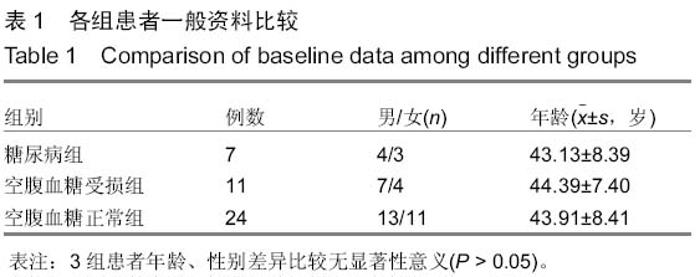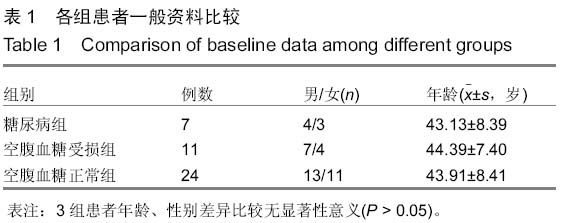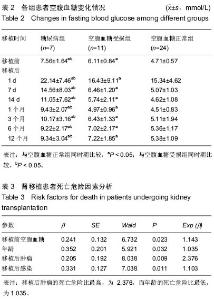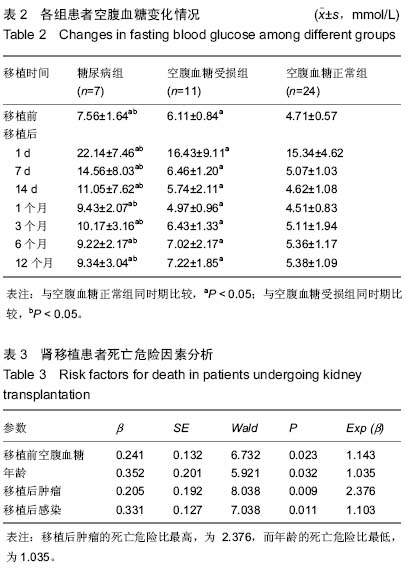| [1] 陈敏灵,于明香,许明,等.肾移植后空腹血糖变化规律及其对预后的影响分析[J].中华内分泌代谢杂志,2012,28(1):40-44.
[2] 许晓婷,黄赤兵,范明齐.肾移植后新发糖尿病患者的免疫抑制方案转换[J].中华内分泌外科杂志,2013,6(6):375-378.
[3] 刘龙山,刘岩峰,邓荣海,等.肾移植后稳定期受者撤除皮质激素的临床研究[J].中华器官移植杂志,2013,34(11):643-646.
[4] 刘相端,曲青山,蒋欣,等.肾移植后血他克莫司浓度与血脂和空腹血糖水平的相关性分析[J].中华器官移植杂志,2013,34(4): 227-230.
[5] 刘慧明.肾移植受者CYP3A4, CYP3A5, ABCB1, ABCC2和HLA-B* 1502基因多态性与移植后肝脏损害的相关性研究[D].广州:南方医科大学,2012.
[6] 李新长,孟栋良,龙成美,等.肾移植受者CYP3A5 基因多态性对他克莫司血药浓度及疗效的影响[J].中国组织工程研究,2012, 16(18):3255-3258.
[7] 牛玉坚,王宏宇,徐春,等.肝移植后糖代谢紊乱的治疗方法和效果[J].中华临床营养杂志,2012,20(4):200-203.
[8] 张学平,王静,王潮,等.肾移植患者血浆FK506浓度与其FBG及 HbA1c 水平的相关性分析[J].中国冶金工业医学杂志, 2014, 1(6):19.
[9] 季曙明,文吉秋,程东瑞,等.采用程序化肾活检评估肾移植后低水平和标准水平他克莫司的疗效[J].器官移植,2012,3(2): 95-101.
[10] 刘忠国,温端改,欧阳骏,等.Th1/Th2细胞因子在大鼠同种异体肾移植中的动态变化及其预测排斥反应与耐受的价值研究[J].滨州医学院学报,2013,1(1):26-31.
[11] 王郁,姚华,热依汉,等.少数民族活体肾移植受者人群的糖尿病患病情况及相关危险因素分析[J].新疆医科大学学报,2014, 37(10):1261-1263.
[12] 钱坤,欧阳新平,李建军,等.环孢素A和他克莫司对1型糖尿病肾移植受者血糖的影响[J].中南医学科学杂志,2014, 42(1):70-73.
[13] 王环宇,吕利,王磊.低血糖指数膳食对肾移植后早期糖代谢异常患者干预效应[J].武警医学,2012,23(6):497-498.
[14] 冯小芳,闵敏,左富姐,等.他克莫司转换为环孢素 A 改善肾移植后新发糖尿病[J].中国组织工程研究,2013,17(53): 9176-9181.
[15] 左富姐,王立明,冯小芳,等.撤除糖皮质激素对肾移植受者发生尿微量蛋白的影响[J].中国组织工程研究,2014,18(36): 5770-5775.
[16] 苗芸,于立新,邓文锋,等.环孢素A短期替代他克莫司对肾移植后新发糖尿病的改善作用[J].中华器官移植杂志,2012,1(1): 14-17.
[17] 何顺梅,张尧,陈显英,等.白细胞介素 2 受体拮抗剂对器官移植受体糖代谢的影响[J].中华内分泌代谢杂志,2013,29(6): 540-543.
[18] Kim I, Kang ES, Yim YS, et al. A low-risk ZnT-8 allele (W325) for post-transplantation diabetes mellitus is protective against cyclosporin A-induced impairment of insulin secretion. Pharmacogenomics J. 2011;11(3):191-198.
[19] Chakkera HA, Mandarino LJ. Calcineurin inhibition and new-onset diabetes mellitus after transplantation. Transplantation. 2013;95(5):10.
[20] 卓越,郑静,李彩玉,等.糖化血红蛋白与空腹血糖的相关性研究[J].滨州医学院学报,2013,1(1):24-25.
[21] Hofer M, Schmid C, Benden C, et al. Diabetes mellitus and survival in cystic fibrosis patients after lung transplantation. J Cyst Fibros. 2012;11(2):131-136.
[22] Luan F L, Steffick DE, Ojo AO. New-onset diabetes mellitus in kidney transplant recipients discharged on steroid-free immunosuppression. Transplantation. 2011;91(3):334-341.
[23] 余意.西罗莫司转换钙调神经蛋白抑制剂防治肾移植后糖尿病的临床研究[D].广州:南方医科大学,2014.
[24] 何晓顺,巫林伟,朱晓峰,等.胰肾联合移植治疗肝移植后糖尿病合并肾功能衰竭二例[J].中华器官移植杂志,2012,33(2): 94-96.
[25] 庄权辉.受体FOXP3基因多态性与肾移植后糖尿病的相关性研究[D].长沙:中南大学,2013.
[26] Yao B, Chen X, Shen FX, et al. The incidence of posttransplantation diabetes mellitus during follow-up in kidney transplant recipients and relationship to Fok1 vitamin D receptor polymorphism. Transpl Proceed. 2013;45(1):194- 196.
[27] Veldt BJ, Duarte-Rojo A, Thompson AJ, et al. Recipient IL28B polymorphism is an important independent predictor of posttransplant diabetes mellitus in liver transplant patients with chronic hepatitis C. Am J Transpl. 2012;12(3):737-744.
[28] 宁媛,李宁,武小桐.长效或中效胰岛素联合口服降糖药治疗肾移植后早期高血糖患者的疗效和安全性比较[J].实用器官移植电子杂志,2013,1(4):226-228.
[29] Werzowa J, Hecking M, Haidinger M, et al. The Diagnosis of Posttransplantation Diabetes Mellitus: Meeting the Challenges. Curr Diabetes Rep. 2015;15(5):1-8.
[30] 郑卫萍.肾移植后新发糖尿病的筛查:空腹血糖具有局限性,下午的血糖和糖化血红蛋白具有诊断优势[J].实用器官移植电子杂志,2013,1(6):362-363.
[31] Ferri C, Sebastiani M, Giuggioli D, et al. Hepatitis C virus syndrome: a constellation of organ- and non-organ specific autoimmune disorders, B-cell non-Hodgkin's lymphoma, and cancer.World J Hepatol. 2015;7(3):327-343.
[32] Grignoli R, Goossens N, Morard I, et al. Extra-hepatic morbidity and mortality related to hepatitis C virus infection. Rev Med Suisse. 2014;10(440):1595-1598.
[33] Berrih-Aknin S. Myasthenia Gravis: paradox versus paradigm in autoimmunity.J Autoimmun. 2014;52:1-28.
[34] Holz LE, Yoon JC, Raghuraman S, et al. B cell homeostasis in chronic hepatitis C virus-related mixed cryoglobulinemia is maintained through naïve B cell apoptosis. Hepatology. 2012; 56(5):1602-1610.
[35] Shiina M, Rehermann B. Cell culture-produced hepatitis C virus impairs plasmacytoid dendritic cell function. Hepatology. 2008;47(2):385-395.
[36] Prandota J. Possible pathomechanisms of sudden infant death syndrome: key role of chronic hypoxia, infection/inflammation states, cytokine irregularities, and metabolic trauma in genetically predisposed infants. Am J Ther. 2004;11(6):517-546.
[37] Le Guern V, Le Roux G, Martin A, et al. Lymphoma complicating common variable immunodeficiency with granulomatous disease: report of two cases. Eur J Haematol. 2003;71(6):459-463.
[38] Shah R, Jindal RM. Reversal of diabetes in the rat by injection of hematopoietic stem cells infected with recombinant adeno-associated virus containing the preproinsulin II gene. Pancreatology. 2003;3(5):422-428.
[39] Mayo MJ. Extrahepatic manifestations of hepatitis C infection. Am J Med Sci. 2003;325(3):135-148.
[40] Belloni C, Avanzini MA, De Silvestri A, et al. No evidence of autoimmunity in 6-year-old children immunized at birth with recombinant hepatitis B vaccine. Pediatrics. 2002;110(1 Pt 1): e4. |



